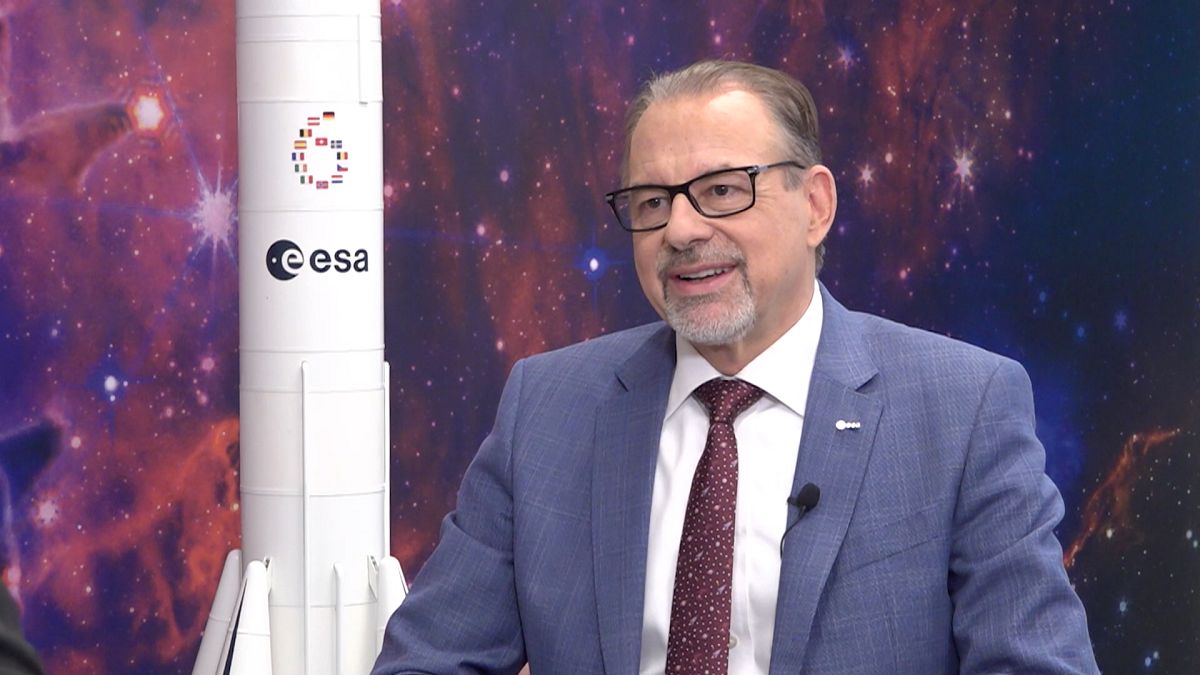2024 is seen as a pivotal year for European space policy. The European Space Agency is rolling out its new generation of launchers in order to hold its own against intensifying international competition.
After years of difficulties and setbacks the European Space Agency is delivering a new generation of rockets that it believes will put Europe back in the vanguard of an increasingly competitive industry. Its Director General, Josef Aschbacher, spoke to Grégoire Lory for the Global Conversation about the ESA’s ambitions and the challenges ahead. He began by asking Aschbacher if the agency was emerging from a launcher crisis with the successfull Vega and Ariane 6 missions in recent months.
“We are on the best way to get out of the launcher crisis,” Aschbacher says. “But, I really would like to say that ESA delivers. We have, delivered Ariane 6, successfully into orbit and this is not a small thing, because these rockets deliver satellites into orbit, which we need for daily life. And this is really fundamental. So really a big step for Europe, and, very big success for Europe. And just, recently we launched Sentinel-2C, with the last flight on Vega. Vega was the ESA rocket in the smaller segment, which we developed some more than 10 years ago. And I think Europe can be very proud and very happy of this continuous series of successes which we deliver,” he adds.
Launcher limits
Aschbacher concedes the agency did have significant problems: “We had a small crisis with launchers for about one year, we did not have our own launch capability but with Ariane 6 back on the launch pad, with Vega now having launched successfully the Sentinel-2C, with Vega-C coming at the end of this year, certainly 2024 is the year when Europe gets out of the launch crisis. But let me just put it a bit in context because sometimes we hear negative news and Europe in the launcher crisis and yes, this was all true, but also our big partner in the United States, NASA, for ten years, was relying on Russia, to bring astronauts into the space station. Of course, now with Space X and the Crew Dragon, this has changed and now again America, the US, has its own astronaut flight capability. But, having a gap in a long series of launches and successes is, I’m not saying normal, but is not a completely unusual thing. But yes, I’m so happy that we are getting out of this crisis now very strong.”
But has Europe has regained some of its space strategic autonomy? Aschbacher believes so: “Yeah, absolutely. I mean, Europe is actually strong in a number of domains. But I’m always comparing Europe with the United States, obviously, as the other major space nation. Of course, China is another one. But in China we do not have, such figures, financial figures and how much investment are made. But if you compare Europe, with the United States, Europe invests about one sixth in the public sector in space. So US about six times as much, the figures are global public investment in space today is about €108 billion in the year 2023, 64%, of this is in the United States and 11% in Europe. So you see, there’s a factor of six, in between.
Catch-up with competitors
“Despite the fact that we are investing much less in space compared to the United States through NASA and the Space Force, Europe is actually really good. We have some of the programs which are among the best in the world. I take Copernicus is one example where we really have built up over 25, more than 25 years, one of the world best space program in Earth observation. We are delivering 300TB of data worldwide to every citizen, around the globe for agriculture, for forestry, for fire brigade users, for civil protection, for the ship routing and many, many disciplines because these data are used across the board in the, in the economy.
“So this is really a fantastic, new program, the other leading program where Europe, has again, built up over, more than 20 years a very strong program is Galileo. Galileo delivers today the most accurate, navigation signals worldwide, more accurate than GPS by the way. Of course, we have still work to do in there other programs where we have to really catch up, on launchers we are just about to catch up. Of course, you always compare with, space X and Falcon nine, and there still we have a long way to go. But again, ESA has made decisions that we also going, the similar way of, buying a service from a private launcher company like the situation is in the United States where NASA is buying launchers or the space Force is buying launchers from space X.
Click on the video above to see the video in full

